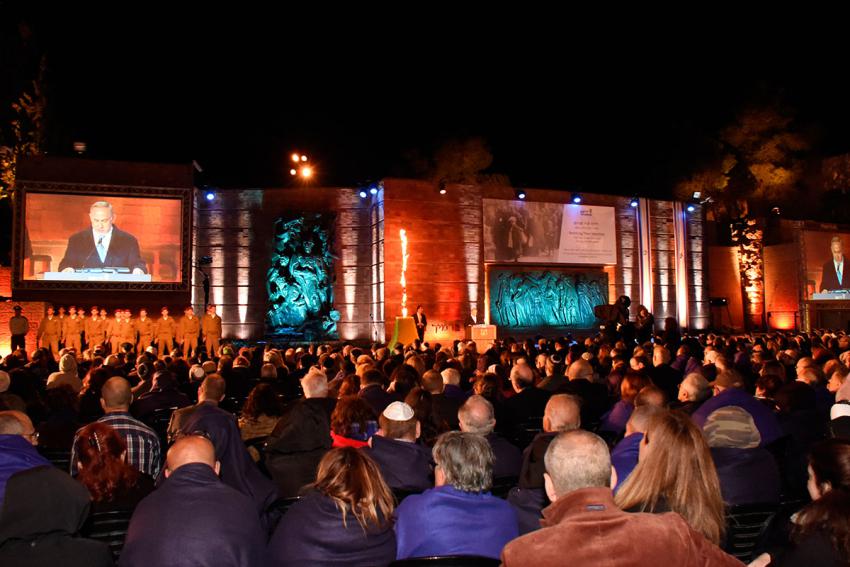02 April 2021
Central Theme for Holocaust Remembrance Day: "Until the Very Last Jew: Eighty Years Since the Onset of Mass Annihilation"
Holocaust Martyrs' and Heroes Remembrance Day will be observed this year starting Wednesday evening, 7 April 2021 through Thursday, 8 April 2021. The official State Opening Ceremony for Holocaust Remembrance Day will take place on Wednesday, 7 April, at 20:00, in Warsaw Ghetto Square, Yad Vashem, on the Mount of Remembrance in Jerusalem. Israel’s President H.E. Mr. Reuven Rivlin and Prime Minister H.E. Mr. Benjamin Netanyahu will both deliver remarks at the Opening Ceremony. Yad Vashem’s Acting Chairman Ronen Plot will kindle the Memorial Torch. Roza Bloch will speak on behalf of the survivors.
During the ceremony, Holocaust survivors will light six torches. First torch: Shmuel Naar; second torch: Zehava Gealel; third torch: Yossi Chen; fourth torch: Halina Friedman; fifth torch: Sara Fishman; sixth torch: Manya Bigunov. During the ceremony, short videos about each of the torchlighters will be shown. Produced and directed by Shlomo Hazan, these videos will be available on the Yad Vashem website in the section dedicated to Holocaust Remembrance Day 2021.
Israeli singers David Daor and Meshi Kleinstein, as well as the IDF Paratroopers’ Honor Guard, will participate in the ceremony, which will also include narrative pieces by Israeli actor Dean Miroshnikov. The MC for the ceremony will be Hila Korach. The ceremony will last approximately 75 minutes.
As in past years, the ceremony will also feature a traditional memorial service, including the recitation of a chapter from Psalms by Chief Rabbi of Israel Rabbi David Lau. The Rishon LeZion, Chief Rabbi of Israel Rabbi Yitzhak Yosef will recite the Kaddish mourner's prayer, and Cantor Avraham Kirshenbaum will recite El Maleh Rahamim, the Jewish prayer for the souls of the martyrs.
Yad Vashem will broadcast the State Opening Ceremony live with simultaneous translation into English, French, Spanish, German, Hebrew and Russian via its websites in their respective languages. Additionally, for the first time, Yad Vashem will offer simultaneous translation in Arabic available on the Yad Vashem YouTube Channel in Arabic. The live feed will also be accessible via Facebook (only live in English and Hebrew).
Roza Bloch
Roza Bloch was born in 1930 in Kaunas (Kovno), Lithuania, to Anna and Markus Gapanovich. She had an older brother, Boris. The family was actively involved in Jewish community life. Anna worked as a manager at a Singer factory and Markus was a businessman, who owned a timber export company. Roza and Boris studied at the Schwabs Hebrew Gymnasium in Kaunas and participated in the activities of the Maccabi sports movement in Kaunas.
In June 1941, the Germans invaded Lithuania. Roza witnessed the murder of dozens of Jews by beatings and strangulation in the yard of the Lietūkis garage perpetrated by Lithuanians. Soon after, the Germans, with the help of Lithuanians, embarked on mass systematic shootings of the Jews. Two of her uncles and their children were murdered in the Seventh Fort by Lithuanians and Germans.
In August, the Germans established a ghetto in Kaunas and the family was interned there. Markus, Anna and Roza were recruited for forced labor outside the ghetto, while Boris stayed to work in the ghetto. Every day, when she went to work, Roza smuggled clothes out of the ghetto and traded them with Lithuanians for food, which she smuggled back into the ghetto for her family. At night, taking a mortal risk, Roza crawled under the barbed wire fence surrounding the ghetto, to get more food for the family and somewhat alleviate the constant distress of gnawing hunger.
During the Great Aktion in the ghetto in October 1941, Roza's paternal grandparents, and uncles and aunts were murdered in the Ninth Fort. Her maternal grandparents died of disease in the ghetto.
Roza was again recruited for forced labor, this time in agriculture. She was later deported with her parents and brother to the Palemonas camp and assigned to forced labor in a brick factory. Roza and her parents were returned from the camp to the Kaunas ghetto. On the way to the ghetto, her brother escaped. The next day, Roza and her mother were deported from the ghetto to the Stutthof concentration camp. Her father was sent to Dachau and murdered there.
Roza and Anna were transferred to other camps where they worked in forced labor, which included digging anti-tank trenches.
Roza tried to escape but was captured and returned to the labor camp. She escaped again, was caught again and transferred to forced labor in various camps. Several times she teetered on the verge of death, but survived thanks to her mother. Roza and Anna were forced on a death march to Chinow, where they were liberated by the Red Army in the spring of 1945 suffering from typhoid fever. Anna, who had survived the Stutthof camp and the death march with Roza, succumbed shortly after liberation to tuberculosis, which she had contracted during the war.
Roza returned to Kaunas to look for surviving family members, and found her brother Boris. She resumed her studies, studied chemistry at the Technion of Kaunas and advanced to the position of senior manager in a confectionary industry.
Roza married Bezalel and the two secretly continued Zionist activities at constant risk. In 1973, they immigrated to Israel with their two daughters.
Roza is active in the Association of Lithuanian Survivors in Israel, lectures to schoolchildren and IDF soldiers, and participates in a range of activities to commemorate the Holocaust.
Roza and Bezalel have two daughters, four grandchildren and six great-grandchildren.







